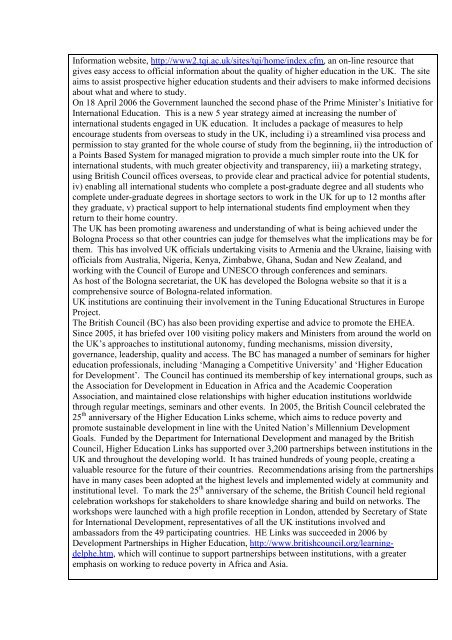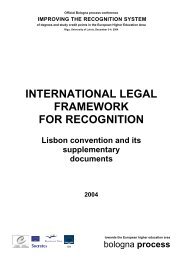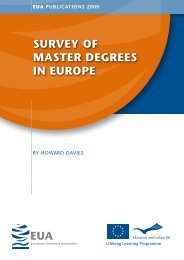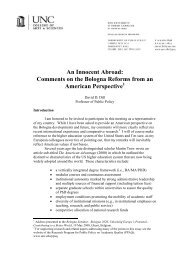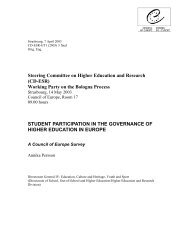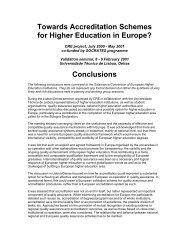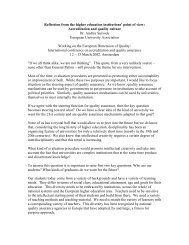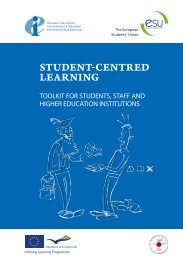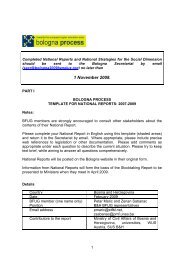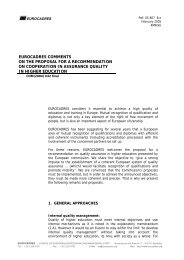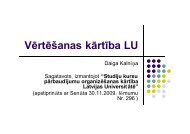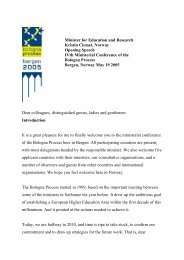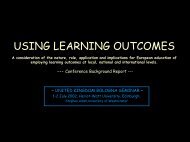BOLOGNA PROCESS - UK England, Wales & Northern Ireland
BOLOGNA PROCESS - UK England, Wales & Northern Ireland
BOLOGNA PROCESS - UK England, Wales & Northern Ireland
You also want an ePaper? Increase the reach of your titles
YUMPU automatically turns print PDFs into web optimized ePapers that Google loves.
Information website, http://www2.tqi.ac.uk/sites/tqi/home/index.cfm, an on-line resource thatgives easy access to official information about the quality of higher education in the <strong>UK</strong>. The siteaims to assist prospective higher education students and their advisers to make informed decisionsabout what and where to study.On 18 April 2006 the Government launched the second phase of the Prime Minister’s Initiative forInternational Education. This is a new 5 year strategy aimed at increasing the number ofinternational students engaged in <strong>UK</strong> education. It includes a package of measures to helpencourage students from overseas to study in the <strong>UK</strong>, including i) a streamlined visa process andpermission to stay granted for the whole course of study from the beginning, ii) the introduction ofa Points Based System for managed migration to provide a much simpler route into the <strong>UK</strong> forinternational students, with much greater objectivity and transparency, iii) a marketing strategy,using British Council offices overseas, to provide clear and practical advice for potential students,iv) enabling all international students who complete a post-graduate degree and all students whocomplete under-graduate degrees in shortage sectors to work in the <strong>UK</strong> for up to 12 months afterthey graduate, v) practical support to help international students find employment when theyreturn to their home country.The <strong>UK</strong> has been promoting awareness and understanding of what is being achieved under theBologna Process so that other countries can judge for themselves what the implications may be forthem. This has involved <strong>UK</strong> officials undertaking visits to Armenia and the Ukraine, liaising withofficials from Australia, Nigeria, Kenya, Zimbabwe, Ghana, Sudan and New Zealand, andworking with the Council of Europe and UNESCO through conferences and seminars.As host of the Bologna secretariat, the <strong>UK</strong> has developed the Bologna website so that it is acomprehensive source of Bologna-related information.<strong>UK</strong> institutions are continuing their involvement in the Tuning Educational Structures in EuropeProject.The British Council (BC) has also been providing expertise and advice to promote the EHEA.Since 2005, it has briefed over 100 visiting policy makers and Ministers from around the world onthe <strong>UK</strong>’s approaches to institutional autonomy, funding mechanisms, mission diversity,governance, leadership, quality and access. The BC has managed a number of seminars for highereducation professionals, including ‘Managing a Competitive University’ and ‘Higher Educationfor Development’. The Council has continued its membership of key international groups, such asthe Association for Development in Education in Africa and the Academic CooperationAssociation, and maintained close relationships with higher education institutions worldwidethrough regular meetings, seminars and other events. In 2005, the British Council celebrated the25 th anniversary of the Higher Education Links scheme, which aims to reduce poverty andpromote sustainable development in line with the United Nation’s Millennium DevelopmentGoals. Funded by the Department for International Development and managed by the BritishCouncil, Higher Education Links has supported over 3,200 partnerships between institutions in the<strong>UK</strong> and throughout the developing world. It has trained hundreds of young people, creating avaluable resource for the future of their countries. Recommendations arising from the partnershipshave in many cases been adopted at the highest levels and implemented widely at community andinstitutional level. To mark the 25 th anniversary of the scheme, the British Council held regionalcelebration workshops for stakeholders to share knowledge sharing and build on networks. Theworkshops were launched with a high profile reception in London, attended by Secretary of Statefor International Development, representatives of all the <strong>UK</strong> institutions involved andambassadors from the 49 participating countries. HE Links was succeeded in 2006 byDevelopment Partnerships in Higher Education, http://www.britishcouncil.org/learningdelphe.htm,which will continue to support partnerships between institutions, with a greateremphasis on working to reduce poverty in Africa and Asia.


